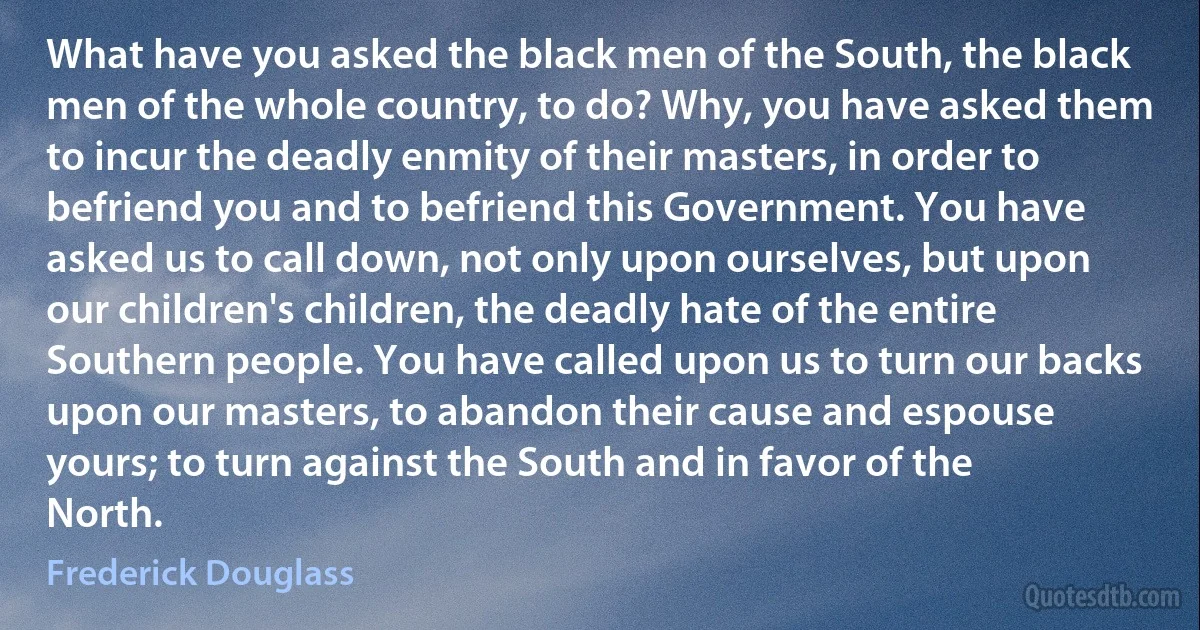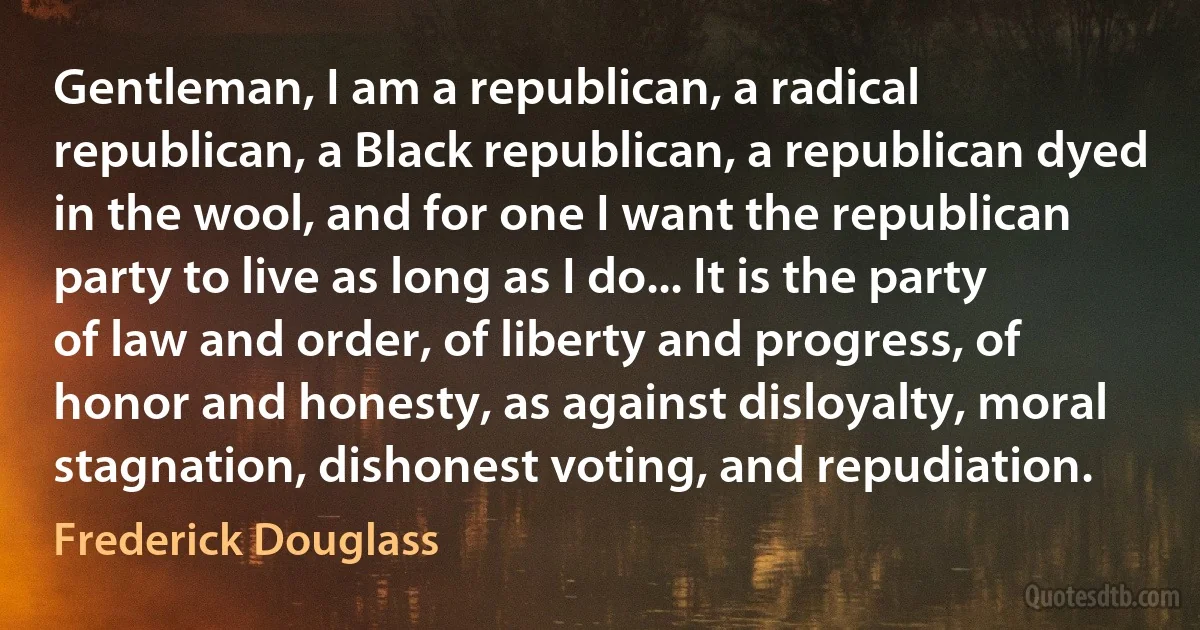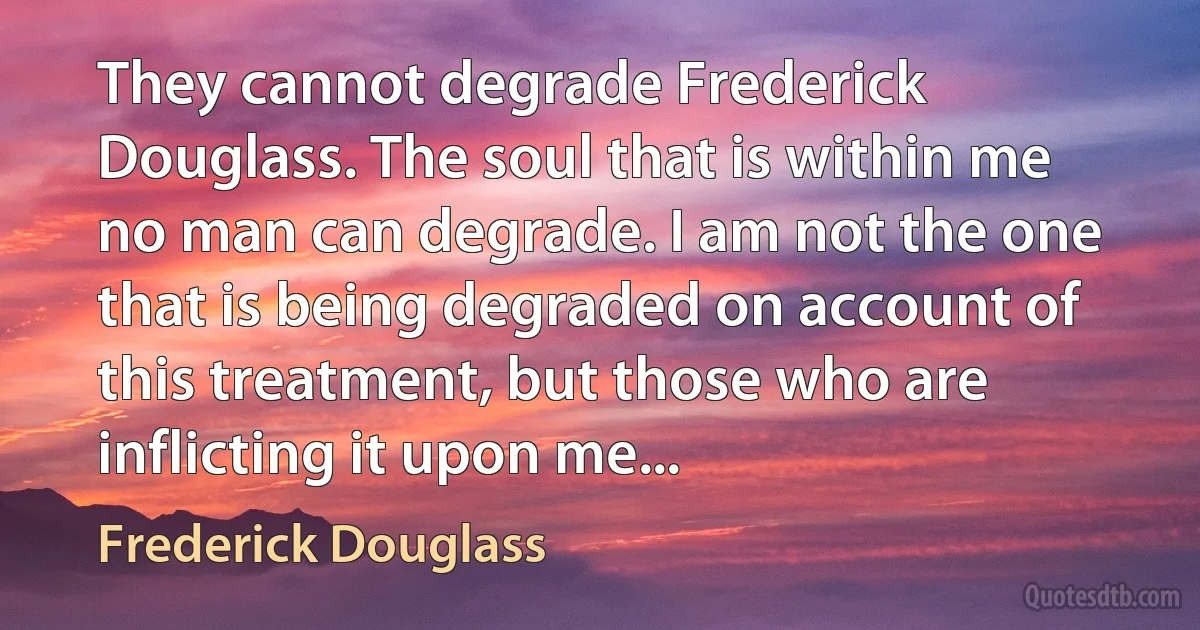Frederick Douglass quotes - page 6
Let him fall if he cannot stand alone! If the Negro cannot live by the line of eternal justice, so beautifully pictured to you in the illustration used by Mr. Phillips, the fault will not be yours, it will be his who made the Negro, and established that line for his government. Let him live or die by that. If you will only untie his hands, and give him a chance, I think he will live. He will work as readily for himself as the white man. A great many delusions have been swept away by this war. One was, that the Negro would not work; he has proved his ability to work. Another was, that the Negro would not fight; that he possessed only the most sheepish attributes of humanity; was a perfect lamb, or an "Uncle Tom;” disposed to take off his coat whenever required, fold his hands, and be whipped by anybody who wanted to whip him. But the war has proved that there is a great deal of human nature in the Negro.

Frederick Douglass
You profess to believe "that, of one blood, God made all nations of men to dwell on the face of all the earth," and hath commanded all men, everywhere to love one another; yet you notoriously hate, (and glory in your hatred), all men whose skins are not colored like your own. You declare, before the world, and are understood by the world to declare, that you "hold these truths to be self evident, that all men are created equal; and are endowed by their Creator with certain inalienable rights; and that, among these are, life, liberty, and the pursuit of happiness;" and yet, you hold securely, in a bondage which, according to your own Thomas Jefferson, "is worse than ages of that which your fathers rose in rebellion to oppose," a seventh part of the inhabitants of your country.

Frederick Douglass
My strongest conviction as to the future of the negro therefore is, that he will not be expatriated nor annihilated, nor will he forever remain a separate and distinct race from the people around him, but that he will be absorbed, assimilated, and will only appear finally, as the Phoenicians now appear on the shores of the Shannon, in the features of a blended race. I cannot give at length my reasons for this conclusion, and perhaps the reader may think that the wish is father to the thought, and may in his wrath denounce my conclusion as utterly impossible. To such I would say, tarry a little, and look at the facts.

Frederick Douglass
As nations are among the largest and the most complete divisions into which society is formed, the grandest aggregations of organized human power; as they raise to observation and distinction the world's greatest men, and call into requisition the highest order of talent and ability for their guidance, preservation and success, they are ever among the most attractive, instructive and useful subjects of thought, to those just entering upon the duties and activities of life.

Frederick Douglass
Self-made men are the men who, under peculiar difficulties and without the ordinary helps of favoring circumstances, have attained knowledge, usefulness, power and position and have learned from themselves the best uses to which life can be put in this world, and in the exercises of these uses to build up worthy character.

Frederick Douglass
Laying aside all prejudice in favor of or against race, looking at the negro as politically and socially related to the American people generally, and measuring the forces arrayed against him, I do not see how he can survive and flourish in this country as a distinct and separate race, nor do I see how he can be removed from the country either by annihilation or expatriation.

Frederick Douglass
There was a time when even brave men might look fearfully upon the destiny of the Republic; when our country was involved in a tangled network of contradictions; when vast and irreconcilable social forces fiercely disputed for ascendency and control; when a heavy curse rested upon our very soil, defying alike the wisdom and the virtue of the people to remove it; when our professions were loudly mocked by our practice, and our name was a reproach and a byword to a mocking; when our good ship of state, freighted with the best hopes of the oppressed of all nations, was furiously hurled against the hard and flinty rocks of derision, and every cord, bolt, beam and bend in her body quivered beneath the shock, there was some apology for doubt and despair. But that day has happily passed away. The storm has been weathered, and the portents are nearly all in our favor.

Frederick Douglass
Europe and Africa are already here, and the Indian was here before either. He stands today between the two extremes of black and white, too proud to claim fraternity with either, and yet too weak to withstand the power of either. Heretofore, the policy of our government has been governed by race pride, rather than by wisdom. Until recently, neither the Indian nor the negro has been treated as a part of the body politic. No attempt has been made to inspire either with a sentiment of patriotism, but the hearts of both races have been diligently sown with the dangerous seeds of discontent and hatred.

Frederick Douglass
Bear in mind, also, and the fact is an important one, that the framers of the Constitution sat with doors closed, and that this was done purposely, that nothing but the result of their labours should be seen, and that that result should be judged of by the people free from any of the bias shown in the debates. It should also be borne in mind, and the fact is still more important, that the debates in the convention that framed the Constitution, and by means of which a pro-slavery interpretation is now attempted to be forced upon that instrument, were not published till more than a quarter of a century after the presentation and the adoption of the Constitution.

Frederick Douglass
When I was about thirteen years old, and had succeeded in learning to read, every increase of knowledge, especially anything respecting the free states, was an additional weight to the almost intolerable burden of my thought, 'I am a slave for life'. To my bondage I could see no end. It was a terrible reality, and I shall never be able to tell how sadly that thought chafed my young spirit.

Frederick Douglass
There is no conceivable reason why all colored people should not be treated according to the merits of each individual. It is not only the plain duty, but also the interest of us all, to have every colored man take the place for which he is best fitted by education, character, ability, manners, and culture. If others insist on keeping him in any lower and poorer place, it is not only his injury, but our universal loss. Yet which of our white congregations would take a colored pastor? How many of our New England villages would like to have colored postmasters, or doctors, or lawyers, or teachers in the public schools? A very slight difference in complexion suffices to keep a young man from getting a place as policeman, or fireman, or conductor, even on the horse cars. The trades-unions are closed against him, and so are many of our stores; while those which admit him are obliged to refuse him promotion on account of the unwillingness of white men to serve under him.

Frederick Douglass
What, then, is the Constitution? I will tell you. It is not even like the British Constitution, which is made up of enactments of Parliament, decisions of Courts, and the established usages of the Government. The American Constitution is a written instrument full and complete in itself. No Court in America, no Congress, no President, can add a single word thereto, or take a single word threreto. It is a great national enactment done by the people, and can only be altered, amended, or added to by the people. I am careful to make this statement here; in America it would not be necessary. It would not be necessary here if my assailant had shown the same desire to be set before you the simple truth, which he manifested to make out a good case for himself and friends.

Frederick Douglass
While this nation is guilty of the enslavement of three millions of innocent men and women, it is as idle to think of having a sound and lasting peace, as it is to think there is no God to take cognizance of the affairs of men. There can be no peace to the wicked while slavery continues in the land. It will be condemned; and while it is condemned there will be agitation. Nature must cease to be nature; men must become monsters; humanity must be transformed; Christianity must be exterminated; all ideas of justice and the laws of eternal goodness must be utterly blotted out from the human soul-ere a system so foul and infernal can escape condemnation, or this guilty republic can have a sound, enduring peace.

Frederick Douglass
Fellow citizens, the fourteenth day of April 1865, of which this is the eleventh anniversary, is now and will ever remain a memorable day in the annals of this republic. It was on the evening of this day, while a fierce and sanguinary rebellion was in the last stages of its desolating power; while its armies were broken and scattered before the invincible armies of Grant and Sherman; while a great nation, torn and rent by war, was already beginning to raise to the skies loud anthems of joy at the dawn of peace, it was startled, amazed, and overwhelmed by the crowning crime of slavery, the assassination of Abraham Lincoln. It was a new crime, a pure act of malice. No purpose of the rebellion was to be served by it. It was the simple gratification of a hell-black spirit of revenge. But it has done good after all. It has filled the country with a deeper abhorrence of slavery and a deeper love for the great liberator.

Frederick Douglass
I assert most unhesitatingly, that the religion of the South - as I have observed it and proved it - is a mere covering for the most horrid crimes; a justifier of the most appalling barbarity; a sanctifier of the most hateful frauds; and a dark shelter, under which the darkest, foulest, grossest, and most infernal abominations fester and flourish. Were I again to be reduced to the condition of A slave, next to that calamity, I should regard the fact of being the slave of a religious slaveholder, the greatest that could befall me.

Frederick Douglass
Suppose it be granted that Mr. Cleveland is a just man, and desires to protect colored citizens in the exercise of their constitutional rights. What is he, and what is any man in the Presidential chair, without the support of his party? As against his party, he is only as a feather against a whirlwind. In the hands of his party, Mr. Cleveland is as clay in the hands of the potter.

Frederick Douglass
If we ought to forget a war which has filled our land with widows and orphans; which has made stumps of men of the very flower of our youth; which has sent them on the journey of life armless, legless, maimed and mutilated; which has piled up a debt heavier than a mountain of gold, swept uncounted thousands of men into bloody graves and planted agony at a million hearthstones. I say, if this war is to be forgotten, I ask, in the name of all things sacred, what shall men remember?

Frederick Douglass
Dark and sad will be the hour to this nation when it forgets to pay grateful homage to its greatest benefactors. The offering we bring to-day is due alike to the patriot soldiers dead and their noble comrades who still live; for, whether living or dead, whether in time or eternity, the loyal soldiers who imperiled all for country and freedom are one and inseparable.

Frederick Douglass



